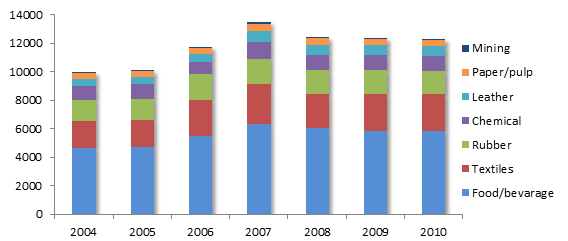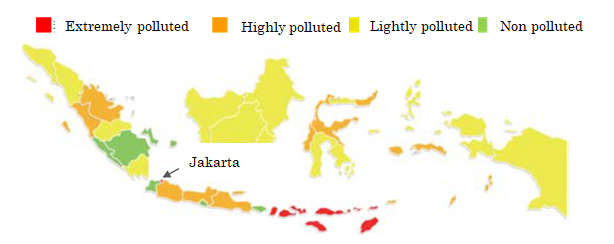Water pollution has become a major problem in Indonesia because wastewater is generally discharged into rivers and lakes directly in the country. This situation is cause by undeveloped sewer systems and untreated industrial wastewater. In particular, wastewater from industries with high environmental impacts (i.e., agriculture, textiles, paper/pulp, petrochemicals, mining, and oil and gas) is a major water pollution source. For example, water sources that are situated near mining sites are potentially contaminated by heavy metals such as mercury.[1] In addition, statistical data on water pollution shows that top potential water polluting companies are from food/beverage, textiles, and rubber industries.

The number of major, small and medium sized companies with potential to pollute surface water [2]
As a result of pollution caused by such industries, most rivers across the country do not satisfy the water quality standards for “Class 1” (suitable for drinking water. See below for the details) set by the state government. In particular, many of rivers on Java Island, in which the city of Jakarta is situated, are highly polluted and classified as “Class 3” or “Class 4.”[3] As shown in the Figure below that illustrates surface water quality, surface water in most parts of Java Island is evaluated as “highly polluted” with most remaining islands being evaluated as “lightly polluted.”

Surface water quality in Indonesia
Legal system for water quality control
In Indonesia, water quality is regulated under the Law No. 32/2009 on Environmental Protection and Management and its subordinate regulations and decrees.
- Law No. 32/2009 on Environmental Protection and Management
A fundamental environment law, which regulates the environmental management in Indonesia generally.
It also stipulates specific penalties.
- Government Regulation No. 82/2001 on Management of Water Quality and Control over Water Pollution.
It stipulates a wide range of requirements to prevent water pollution.
It sets the land water quality standards.- Decree of the Minister of Environment No. 111/2003 Concerning the Guidelines to the Requirements and Procedures of License and Review Manual on Liquid Waste Disposal into the Water or Water Resources
and
Decree of the Minister of Environment No. 141/2003 that amends the Decree No.111/2003.
It gives guidance on licensing procedures on discharge of wastewater into rivers.
- Decree of the Minister of Environment No. 51/2004 Concerning Sea Water Quality Standard
It sets sea water quality standards.
- Regulation of the Minister of Environment No. 12/2006 Concerning the Licensing
Requirements and Disposal of Wastewater to the Sea
It gives guidance on licensing procedures on discharge of wastewater into the sea. - Regulation of the Minister of Environment No. 3/2010 Concerning Wastewater Quality Standards for Industrial Estate
It gives wastewater quality standards for industry estates. - Regulation of the Minister of Environment No. 5/2014 Concerning Wastewater Quality Standards
It gives wastewater quality standards for various industries. - Regulation of Ministry of Environment and Forestry No.93/2018 Concerning the Industrial Effluent Monitoring Continuously and Online for Business and/or Activities
It mandates certain industrial sectors to install online and continuous wastewater monitoring equipment.
- Decree of the Minister of Environment No. 111/2003 Concerning the Guidelines to the Requirements and Procedures of License and Review Manual on Liquid Waste Disposal into the Water or Water Resources
- Government Regulation No. 82/2001 on Management of Water Quality and Control over Water Pollution.
The most important regulation on water quality control in Indonesia is the Government Regulation No. 82/2001 on Management of Water Quality and Control over Water Pollution. Promulgated in December 14 of 2001, this Regulation replaced the Government Regulation No. 20/1990 on Control Over Water Pollution.[4] The Government Regulation No. 82/2001, which was established under the Law No. 32/2009 on Environmental Protection and Management, stipulates wide-ranging requirements including the classification of water quality, water quality standards, and measures for preventing water pollution.
Every personnel in responsible for business disposing wastewater into water source is obliged to prevent and overcome water pollution (Article 37 of the Government Regulation No. 82/2001). Every business and/or activity planning to dispose wastewater into water sources is obliged to obtain a written license from regents/mayors. Any application for the license shall be made based on the results of environmental impact analysis (“AMDAL”) or environmental management programs and Environmental monitoring programs (Article 40 of the same). Details of the licensing procedures are stipulated in the Decree of the Minister of Environment No. 111/2003 that sets the application form in its Annex and gives details for the information required to be submitted including:
- General information of the applicant (e.g., name, address, and contact information)
- Registration numbers of licenses that the applicant currently holds (e.g., permits for operation and construction)
- Information on manufacturing process (water intake, water consumption, manufacturing volume, etc.)
- Information on environmental issues
- Information on wastewater
- Information on solid wastes
On the other hand, it should be noted that discharging wastewater into the sea requires to obtaining a license under the Regulation No. 12/2006.
Other requirements include emergency responses. Every business and/or activity is obliged to make a plan for overcoming water pollution in an emergency condition (Article 25 of Regulation No. 82/2001). In case of emergency, the business is obliged to minimize water pollution and restore the water quality (Article 26). Any authorized official receiving a report of water pollution is obliged to record the details on and to clarify the cause of the pollution. Then, the competent regents/mayors/minister who received the report of pollution from the authority is obliged to order the business to take corrective actions against the pollution (Article 27).
[1] WEPA, State of water environmental issues in Indonesia
http://www.wepa-db.net/policies/state/indonesia/indonesia.htm
[2] The Ministry of Environment, The Current Situation of Environment Pollution in Indonesia
https://www.env.go.jp/air/tech/ine/asia/indonesia/files/pollution/files/pollution2016.pdf
[3] The Ministry of Environment, The Current Situation of Water and Wastewater Control in Indonesia
https://www.env.go.jp/air/tech/ine/asia/seminar/files/H240208/2_Arif.pdf
[4] The Regulation No. 82/2001 was initially expected to be enacted on the date of promulgation without giving any transition period. But it was finally enacted in 2005 after some technical adjustment.
 Indonesia, Water Quality Control
Indonesia, Water Quality Control
























